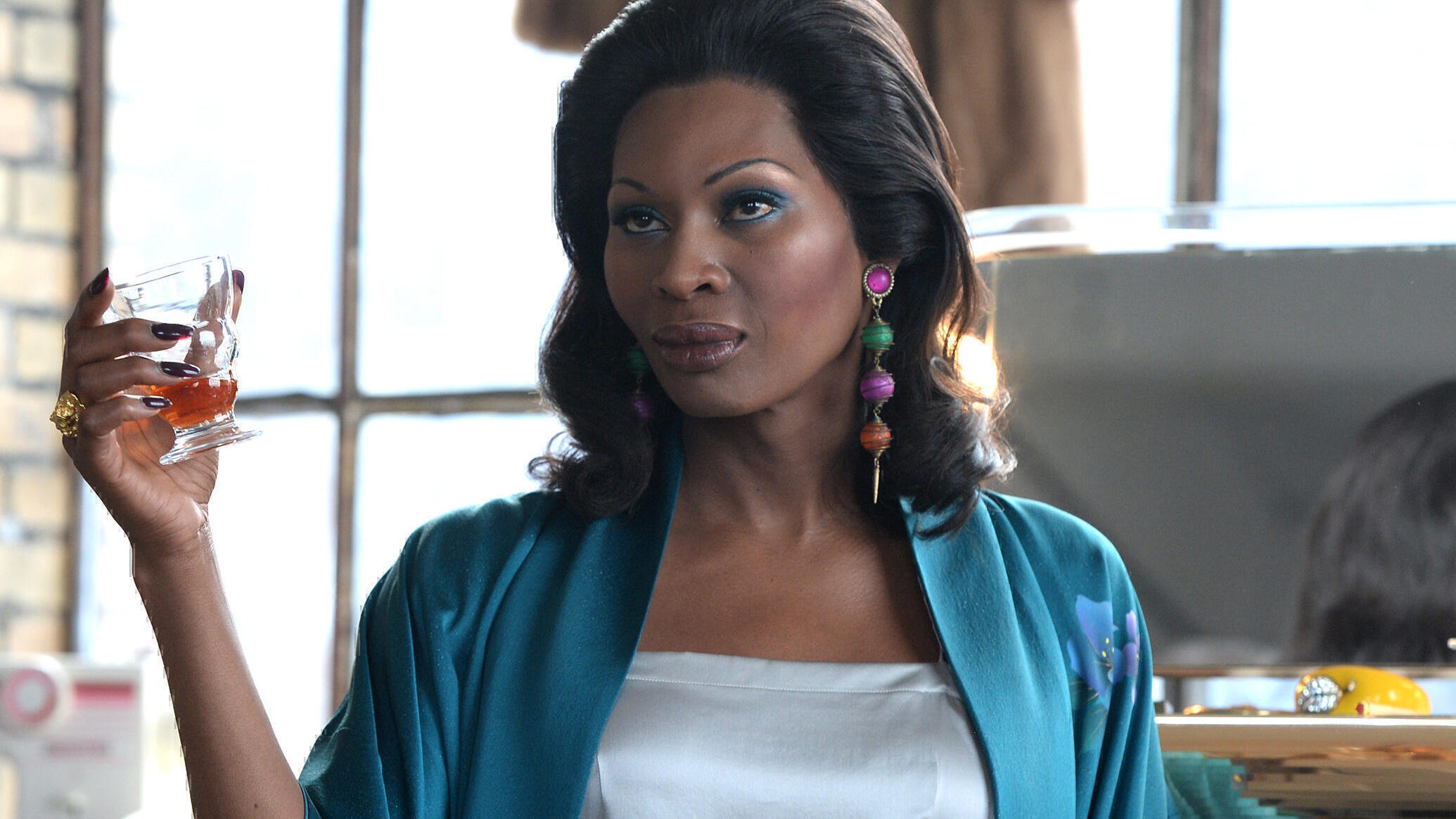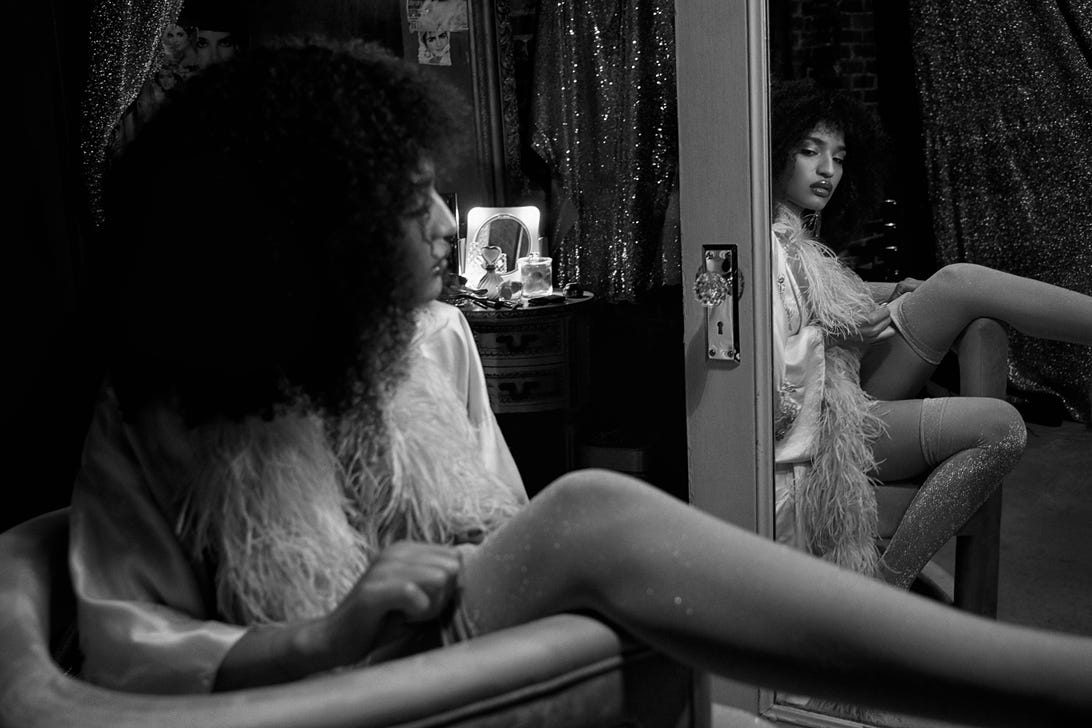
'Pose' Wants to Change the Conversation Around Trans Sex
"I've been searching for that love story my entire life," Janet Mock told TV Guide.
"Take off your panties," Stan (Evan Peters) tells Angel (Indya Moore) the transgender sex worker he takes to his seedy hotel room in Pose's first episode. Violence, or the threat of it, hovers above the room like smoke; one doesn't need to know that a record number of trans women of color were killed in 2017 to intuit that Stan's discovery of Angel's penis is not going to end well. But something else happens instead. Stan softens, and reveals his attraction to her body just as it is, even if, for Angel, her genitalia is the last vestige of an identity she wants to shed, an identity that never really suited her in the first place. In that one scene, Pose hands viewers a complicated knot of ideas about trans anatomy and the huge gray areas between homosexuality and heterosexuality.
A lot of men have not been able to interrogate (their attraction to trans women) because of our ideals around masculinity and what makes a real man.
"People are like, 'Oh sh-t! What's going to happen?'," Janet Mock, the trans author and activist who wrote, produced and directed for Pose, told TV Guide. "We have linked trans bodies to so much trauma, that's where we go in a moment like that." But in keeping with Pose's main theme of triumph over tragedy, this scene and others like it buck tradition. "What can't she just be loved? Why can't she just be embraced?"
Mock wrote all of Pose's sex scenes, an opportunity she took to "undo the link between our bodies as being points targets of violence and ridicule." Angel is stunned to learn she can be valued and appreciated exactly as she is, even at her own perceived worst. "I've been searching for that love story my entire life," Mock said.
Everybody knew Pose would include the largest number of transgender actors (and producers, writers and other creatives) ever seen on TV, but nobody could've predicted how deeply and unflinchingly Pose would present complexities of trans life -- especially sex. Most of what the American populace knows about trans issues boils down to debates over which bathroom people can pee in, but Pose's education starts by working from the most universal of anchors -- the human need for intimacy -- and then drills down into the ways being a trans woman of color complicates achieving this basic need. Radical for their rarity on TV, moments depicting Angel (and a few episodes later, Elektra) in bed flip the script on a conversation normally relegated to the edges of shows like Law and Order: SVU by presenting trans women as empowered and valuable yet still confined. If sex is a political act, so often informed by religious and cultural codes as well as baggage about power and who's giving it away, then Pose's sex scenes are a Molotov cocktail intended to burn down the old system and start a revolution.
Angel and Elektra's erotic tales get into nitty gritty mechanics that most people know are too intrusive to ask trans people about. Pose confronts what it means to be a woman with a penis, what it means to be a straight man who's attracted to a woman with male genitalia, and addresses whether that has to mean anything at all. Stan is confused by his attraction to Angel and women like her, wracked with shame and guilt but Elektra's lover, introduced in Episode 4, (a surprise casting TV Guide won't spoil here) is confident in his attraction to Elektra but doesn't have language to explain his affinity for what remains between Elektra's legs.
"I can't explain why my dick gets hard knowing yours is in the room," Elektra's suave, rich white lover says. "I just know I want it there." Hulking and hairy, Elektra's patron looks very much like the idealized version of masculinity that's been around for ages, making it another scene that torches preconceptions about what "real" men look like and what "real" men do in bed. Pose starts in 1987, but in light of alarmingly commonplace violence against trans women and increasing attempts by the White House to roll back protections for trans people today, these scenes crackle with urgency and relevance. Angel and Elektra feel real -- like people who deserve not just basic human respect and dignity, but also the everyday bliss of affection that straight and even gay people get to enjoy without as much consequence. Series creator Steven Canals, whose partner is a transgender man, told TV Guide, "What we wanted to do was show all the various sides of the complexities of a loving relationship. We spent a lot of time in the room talking about the misinformation the cis-gender community has about trans people -- especially straight men with trans women. We wanted to unpack those complexities."

Indya Moore as Angel, Pose
FXAs sensitive and kind as Angel and Elektra's partners are with them, the relationships have elements of transphobia and suffering inherent in them too. Both women remain their man's secret, tucked away in plush, elegant settings to be played with when convenient; they don't get invited to the galas and the office Christmas parties. And both women long for the procedure to align their bodies with their true gender identities; both find that their paramours don't support that desire. Through them, viewers get to consider, perhaps for the first time, what it would be like to constantly wonder if your partner appreciates your unconventional body because they see you as a whole person or because they see you as a curiosity or some sort of titillating fetish. "These are the conversations couples have all the time about bodies they're sharing," Mock said. "A lot of men have not been able to interrogate (their attraction to trans women) because of our ideals around masculinity and what makes a real man. When I wrote these scenes I knew they didn't have to be graphic -- they just had to be super telling and they needed to tell the complicatedness of what we do when we thrust our bodies against one another, and how can we find truth and love and acceptance in those stories."
What we wanted to do was show all the various sides of the complexities of a loving relationship.
Pose, already defiant for making trans people of color the protagonists, empowers its heroes by giving them choice. Angel is infinitely more confident than Stan, in bed and out. Elektra, Pose's great ball of fire, has the same intensity with her alpha male lover that she shows when collecting trophies in the ballroom. "No man gets to tell me what I do with my body," is the prevailing theme of these women's sex lives, Mock said -- an idea that requires absolutely no understanding of trans life whatsoever in order to be understood by anyone watching. But for trans people who've not shared these narratives on a scale like this before, the show's pillow talk disrupts generations of neglect, derision and even violence to show trans women procuring love, chasing dreams and finding fulfillment. Angel is the character Mock said she most poured herself into; the way she dresses and longs for love and romance comes straight from her own experience as a trans girl growing up in Hawaii. "I was a lovesick 15-year-old who only wanted a boy to hold my hand," said Mock, who married her husband Aaron in 2015. "And I never got that."
Pose airs Sundays at 10/9c on FX.
